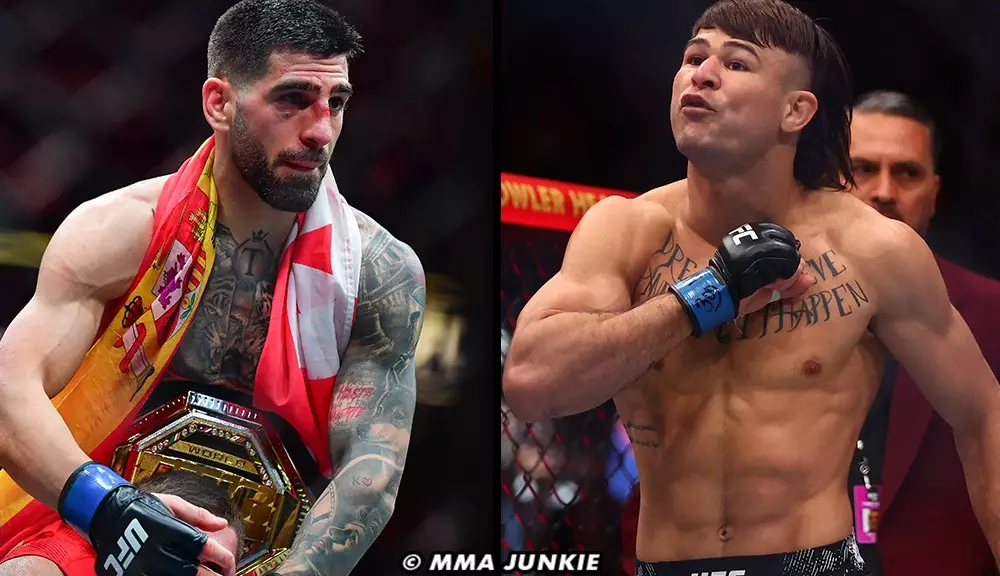The landscape of the Ultimate Fighting Championship (UFC) is ever-evolving, and recent developments have stirred considerable conversation regarding its future structure, particularly in relation to champion-vs.-champion matchups. The announcement from UFC CEO Dana White, stating that rising star Ilia Topuria will vacate the featherweight championship, serves as a pivotal moment in this discourse. Diego Lopes, a fighter who stands to gain significant opportunities from this shift, has expressed insight into the underlying motivations for this strategic change.
Lopes, who holds a record of 26 wins to 6 losses in mixed martial arts and has made a name for himself in the octagon, emphasized that the UFC is moving towards a structure where champions are discouraged from transitioning between weight classes without letting go of their titles. His assertion highlights a broader trend where UFC management seems to favor a more streamlined championship designation rather than the concept of dual champions straddling divisions. This shift potentially addresses the complications and inconsistencies that arise when a champion’s time and focus are divided between two weight classes.
The crux of Lopes’ comments relates to Topuria’s frustrations about making weight and his stated desire to move to lightweight, where he aims to challenge reigning champion Islam Makhachev. The UFC’s stance appears to suggest that unless fighters commit fully to a new division by vacating their titles, they will not receive opportunities to challenge for another belt. This decision is being framed as a method to maintain clarity in title contention and uplift fighters who are actively competing within their divisions.
For fighters, this new approach introduces a strategic conundrum: should one relinquish their hard-earned championship status just to pursue a different challenge? Lopes has expressed understanding of Topuria’s decision to vacate, acknowledging that every fighter has a unique perspective on their career trajectory. While Lopes advocates for more potential matchups within the featherweight division, he simultaneously recognizes Topuria’s rationale for seeking new challenges. This dichotomy reveals an ongoing debate in the sport about ambition and loyalty to a weight class.
From a fan’s perspective, the consequences of this philosophy might be mixed. Some may appreciate a clearly defined championship structure where contenders ascend through rankings without the ambiguity introduced by champions dabbling in multiple weight classes. Others, however, could lament the loss of excitement that comes with blockbuster champion-vs.-champion bouts, which have historically drawn significant attention and excitement to the sport. The UFC’s shift may thus polarize its fanbase, raising questions about the future of high-stakes matchups that once captivated audiences.
Throughout its 30-plus years of operation, the UFC has hosted only a handful of champion-vs.-champion fights, with notable examples being Conor McGregor vs. Eddie Alvarez and Amanda Nunes vs. Cris Cyborg. Each of these matches was not only a showcase of talent but also an era-defining moment that bolstered fan interest and marketability. The rarity of such encounters raises an important question: will the UFC’s newfound rigidity produce a diluted array of matchups, or could it carve a path forward that revitalizes the love for single-division competition?
Moreover, Lopes’ insights on UFC’s communication with its champions imply that there might be a concerted effort to promote fighters who are dedicated to a single weight class, fostering more intriguing rivalries over time. This transition could encourage a new era of fighters who prioritize building their legacies through consecutive title defenses, rather than chasing fleeting dual-championship glory.
As much as the recent announcements may have stirred the pot, this evolution within the UFC could ultimately foster a healthier competitive environment. It may lead to more significant rivalries and clearer pathways for young fighters looking to ascend the ranks without the distractions of competing for titles in multiple categories. While only time will tell how this shift resonates within the sport, the prospect of a more focused and streamlined championship situation could herald a promising future for the UFC and its athletes alike.

